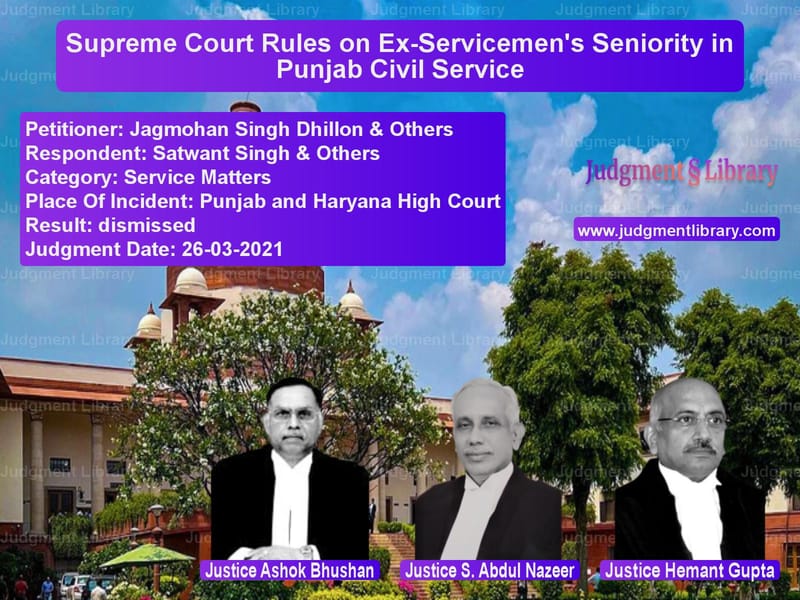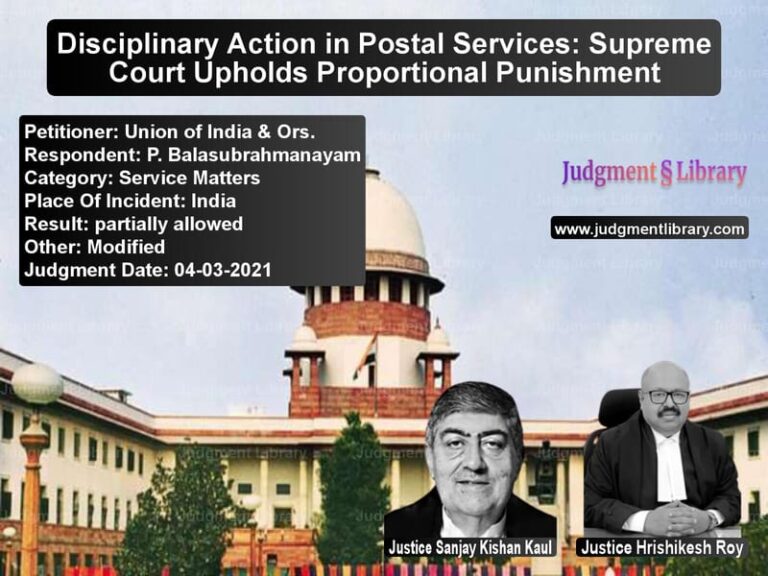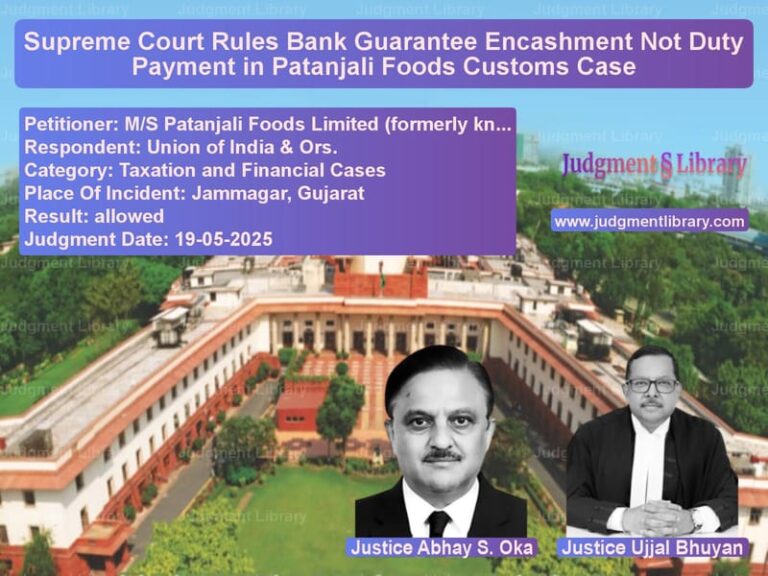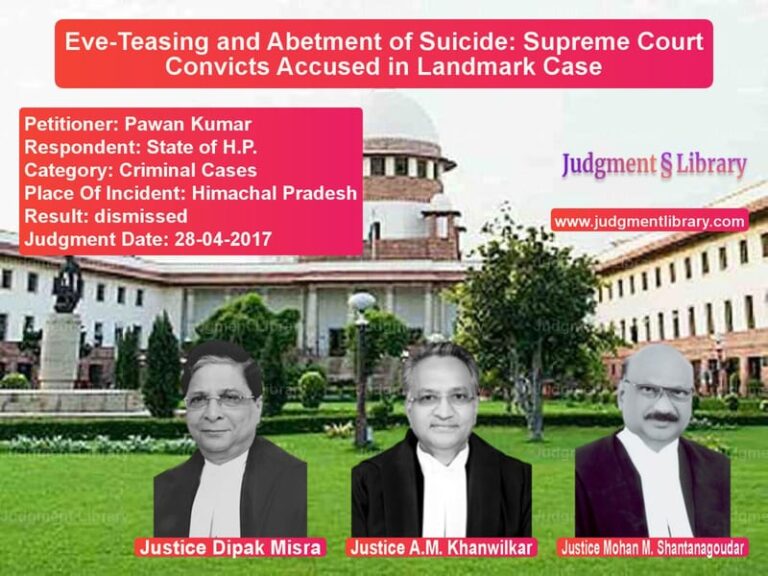Supreme Court Rules on Ex-Servicemen’s Seniority in Punjab Civil Service
The Supreme Court of India delivered a crucial verdict in Jagmohan Singh Dhillon vs. Satwant Singh & Ors., deciding the seniority rights of ex-servicemen appointed to the Punjab Civil Service (Executive Branch). The ruling focused on whether the 1972 or 1982 rules governed the petitioners’ seniority and the applicability of military service in determining rank.
Background of the Case
The appellants, ex-servicemen, were appointed to the Punjab Civil Service (Executive Branch) after their release from the Army. Their recruitment was governed by the Demobilized Indian Armed Forces Personnel (Reservation of Vacancies in the Punjab Civil Service) (Executive Branch) Rules, 1972, which allowed military service to be counted for seniority.
Read also: https://judgmentlibrary.com/supreme-court-upholds-promotion-criteria-for-haryana-police-inspectors/
However, a subsequent set of rules—the Punjab Recruitment of Ex-Servicemen Rules, 1982—repealed the 1972 rules. The appellants argued that they were recruited for vacancies that arose before 1982, and thus, their seniority should be determined under the 1972 rules.
Arguments by the Petitioner (Jagmohan Singh Dhillon & Others)
- The appellants contended that since their recruitment was for vacancies that existed before the enforcement of the 1982 Rules, the 1972 Rules should govern their seniority.
- They relied on a 1986 judgment in Ishwar Singh & Others vs. State of Punjab, which ruled that 20% of vacancies were reserved for ex-servicemen as per the 1972 Rules.
- The Single Judge of the Punjab and Haryana High Court had ruled in their favor, stating that their seniority should be determined as per the 1972 Rules.
Arguments by the Respondents (State of Punjab & Others)
- The respondents argued that the appellants were appointed under an advertisement issued in 1982, after the new rules had come into force.
- Under the 1982 Rules, there was no provision to count military service for seniority.
- Once the 1982 Rules came into effect, all prior rules, including the 1972 Rules, were repealed.
Supreme Court’s Observations
The Supreme Court carefully examined the applicability of the 1972 and 1982 rules, making the following key observations:
- Rules in Effect at the Time of Appointment: The Court noted that the appellants were appointed in 1986, long after the enforcement of the 1982 Rules. Since these new rules repealed the 1972 Rules, the appellants could not claim benefits under the old framework.
- Difference Between Vacancy and Appointment: The Court clarified that the date of vacancy does not determine which rules apply. Instead, the rules in force at the time of actual appointment govern seniority.
- Distinguishing from Ishwar Singh Case: The Court ruled that the Ishwar Singh case dealt with reservation of vacancies, not seniority determination. Thus, it was not applicable to the present case.
The Court stated:
“Seniority is governed by the statutory rules in force at the time of appointment. The fact that vacancies arose before the enforcement of new rules does not entitle appointees to claim benefits under repealed rules.”
Supreme Court’s Final Verdict
- The Supreme Court dismissed the appeal, affirming that the appellants’ seniority should be determined under the 1982 Rules.
- The 1972 Rules no longer applied once they were repealed, and military service could not be counted toward seniority.
- The Court upheld the judgment of the Division Bench of the Punjab and Haryana High Court, which had ruled against the appellants.
Impact of the Judgment
- Clarification on Seniority Rules: The ruling establishes that seniority is determined based on the rules in effect at the time of appointment, not the time of vacancy.
- Reaffirmation of Repealed Rules Doctrine: The judgment clarifies that once new rules are introduced and old rules are repealed, benefits under the previous framework cannot be claimed.
- Precedent for Future Recruitment Cases: The decision serves as a guiding precedent for interpreting service rules in cases involving recruitment from a pool of prior vacancies.
Conclusion
The Supreme Court’s judgment in Jagmohan Singh Dhillon vs. Satwant Singh & Others is a landmark decision clarifying seniority determination for ex-servicemen in government jobs. It reinforces the principle that the rules in force at the time of appointment apply, ensuring uniformity and consistency in service law. This ruling will influence future disputes regarding seniority and reservations in government employment.
Petitioner Name: Jagmohan Singh Dhillon & Others.Respondent Name: Satwant Singh & Others.Judgment By: Justice Ashok Bhushan, Justice S. Abdul Nazeer, Justice Hemant Gupta.Place Of Incident: Punjab and Haryana High Court.Judgment Date: 26-03-2021.
Don’t miss out on the full details! Download the complete judgment in PDF format below and gain valuable insights instantly!
Download Judgment: jagmohan-singh-dhill-vs-satwant-singh-&-othe-supreme-court-of-india-judgment-dated-26-03-2021.pdf
Directly Download Judgment: Directly download this Judgment
See all petitions in Employment Disputes
See all petitions in Promotion Cases
See all petitions in Transfers Cases
See all petitions in Pension and Gratuity
See all petitions in Recruitment Policies
See all petitions in Judgment by Ashok Bhushan
See all petitions in Judgment by S. Abdul Nazeer
See all petitions in Judgment by Hemant Gupta
See all petitions in dismissed
See all petitions in supreme court of India judgments March 2021
See all petitions in 2021 judgments
See all posts in Service Matters Category
See all allowed petitions in Service Matters Category
See all Dismissed petitions in Service Matters Category
See all partially allowed petitions in Service Matters Category







